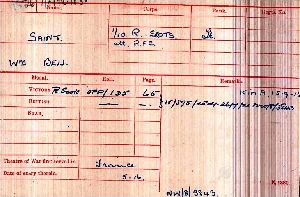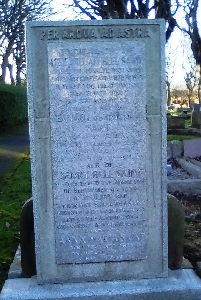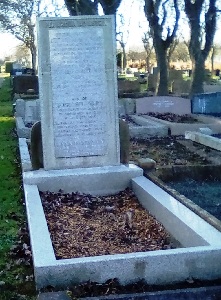De Ruvigny Roll of Honour Vol 2 page 267
Photo : Imperial War Museum HU 126115

Medal Index Card

Photo : Angela Conroy

Photo : Angela Conroy
At Whitley Bay Cemetery is a family headstone.
'Per Adua Ad Astra
To The Memory of
Lieut. William Bell Saint
Observer Royal Flying Corps
who met his death while flying
in France on the 15th Day of
September 1916
At the age of 23
Beloved son of
Henry Bell and Anna Maria
Saint
of Monkseaton
His body laid in Tincourt
New British Cemetery
Department of the Somme
and of
Henry Bell Saint
who entered the higher life
on September 9th 1939
in his 83rd Year.
And a Man shall be as an
hiding place from the wind
and as a the shadow of a
great rock in a weary land
and of
Anna Maria Saint
who rejoined them
on August 1st. 1944
in her 88th Year'
William Bell Saint was born at Newcastle-upon-Tyne on the 31st July 1893, the youngest son of Henry Bell Saint, of 'Selbourne', Monkseaton, a Canned Goods Merchant, and his wife Anna Maria, daughter of William Robson.
William was educated at Tynemouth School and Stramongate School, Kendal and Mill Hill London. N.W.
He then worked for George Watson and Co at Newcastle which his father was a partner.
William volunteered for foreign service and enlisted into the University and Public Schools Battalion on the 5th September 1914. Then William obtained a commission as 2nd Lieutenant in the 10th Royal Scots on the 10th July 1915.
He joined the Royal Flying Corps and underwent training at Netheravon, Erdington and Hythe passing his Lewis Gun training course. William then was promoted to Lieutenant on the 8th July 1916.
William served in France from the 21st May 1916, where he was engaged in general patrol work, regularly using his gun and also photographing.
He was attached to the 70th Squadron and died on the 15th September, from wounds received from enemy fire whilst flying over the German lines a few hours previously.
His Commanding Officer wrote:- I am very sorry to lose your son. He was the last of the veteran observers of the squadron. He had done extremely good work all the time, and I had previously put his name in to go home to learn to fly. He is a great loss to the squadron...If anyone in the squadron deserved to get through he did. He had worked so well, and for so long.
His pilot, who is now (1918) a prisoner of war stated:- Your son's machine gun would not work properly at the time we were attacked by three German machines, one of which got behind our machine and one of the bullets caught the petrol pipe and also went into my foot. It must have been this machine which fired the shots into your son.
I think two penetrated his chest. The place where we landed was good ground, and your son's first thoughts were to burn the machine, but it was in his attempts to do so that he collapsed. There was a dressing station about half a mile away, and I got some German soldiers to carry him there. After the first dressing Station we were carried on stretchers to a place on a road where we had to wait for horse ambulance to take us to the next dressing station.
We had to wait sometime, and it was there your son died. His last request to me was, 'Write to my people and tell them that I am all right'. He then tried to give me your address, but was too weak.
His chief in business wrote in the firms "House Magazine" I think that 'sunniness' is the word that best describes him. A half-hidden smile constantly hung about the lines of his humorous mouth and beamed from his frank friendly eyes. There was an irresistible air of cheerfulness about him, and a spirit of boyishness-which we generally lose all too soon - pervading him.
He immediately made friends in our circle when he joined our staff at Headquarters , at the end of his public school life. His work was always well done, for he hated slackness, or anything that savoured of being second best.
De Ruvigny Roll of Honour
Whitley Seaside Chronicle and Visitors' Gazette04/11/1916 reported the death:
LOCAL CASUALTIES
SECOND LIEUT. W. B. SAINT KILLED
It is with great regret we hear that Mr and Mrs H. B. Saint, Selborne, Monkseaton, have read intimation of the death, in France, of their son, Second Lieut. William Bell Saint, Royal Scots, attached to Royal Flying Corps. The deceased officer joined a public school battalion in September, 1914, and about eight months after he obtained a commission in the Royal Scots. In January of this year he was attached to the Royal Flying Corps as an observer, and he went to the front on May 21st. In the last five months he took a very active part in the air service, and was regularly engaged in patrol work. Details of his death are not yet to hand, but it seems that his machine was brought down in the German lines. The pilot escaped with a broken ankle, and it is considered probable that Lieut. Saint reached the ground alive, and that he afterwards succumbed to wounds received while descending. The deceased was 23 years of age. He went into the business of Messrs. Angus Watson and Company, Newcastle with which his father is associated, and had been identified with it for about two years previous to joining the colours.
On the 27th July 1916 as another aircraft was lost today, as Lieutenants Leslie Charles Pockney and William Bell Saint smashed up their aircraft (5719) on landing from a reconnaissance over Cambrai.
2nd Lieutenant Fritz Bowyer was wounded but survived while his observer 2nd Lieutenant William Bell Saint was killed by unknown pilots from Jasta 2 and Frankl from Jasta 4.
Research by : Angela Conroy/James Pasby
William Bell Saint is remembered at Whitley Bay W84.01, W84.02, W84.16 in W84.30 page 15, and Newcastle NUT117

